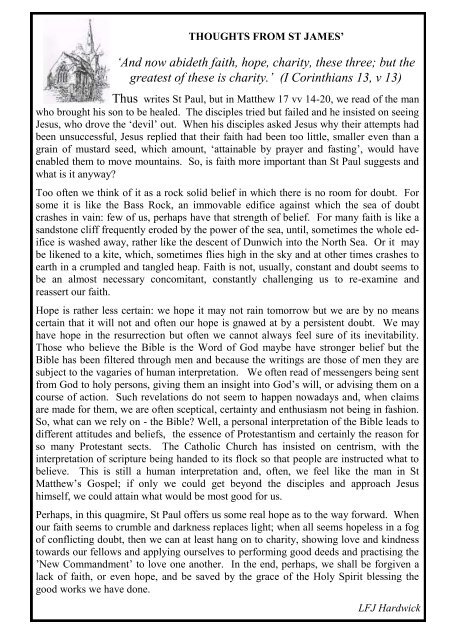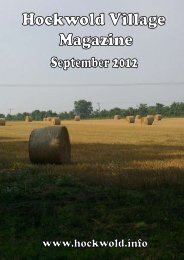parish council - Hockwold-cum-Wilton
parish council - Hockwold-cum-Wilton
parish council - Hockwold-cum-Wilton
Create successful ePaper yourself
Turn your PDF publications into a flip-book with our unique Google optimized e-Paper software.
THOUGHTS FROM ST JAMES’<br />
‘And now abideth faith, hope, charity, these three; but the<br />
greatest of these is charity.’ (I Corinthians 13, v 13)<br />
Thus writes St Paul, but in Matthew 17 vv 14-20, we read of the man<br />
who brought his son to be healed. The disciples tried but failed and he insisted on seeing<br />
Jesus, who drove the ‘devil’ out. When his disciples asked Jesus why their attempts had<br />
been unsuccessful, Jesus replied that their faith had been too little, smaller even than a<br />
grain of mustard seed, which amount, ‘attainable by prayer and fasting’, would have<br />
enabled them to move mountains. So, is faith more important than St Paul suggests and<br />
what is it anyway?<br />
Too often we think of it as a rock solid belief in which there is no room for doubt. For<br />
some it is like the Bass Rock, an immovable edifice against which the sea of doubt<br />
crashes in vain: few of us, perhaps have that strength of belief. For many faith is like a<br />
sandstone cliff frequently eroded by the power of the sea, until, sometimes the whole edifice<br />
is washed away, rather like the descent of Dunwich into the North Sea. Or it may<br />
be likened to a kite, which, sometimes flies high in the sky and at other times crashes to<br />
earth in a crumpled and tangled heap. Faith is not, usually, constant and doubt seems to<br />
be an almost necessary concomitant, constantly challenging us to re-examine and<br />
reassert our faith.<br />
Hope is rather less certain: we hope it may not rain tomorrow but we are by no means<br />
certain that it will not and often our hope is gnawed at by a persistent doubt. We may<br />
have hope in the resurrection but often we cannot always feel sure of its inevitability.<br />
Those who believe the Bible is the Word of God maybe have stronger belief but the<br />
Bible has been filtered through men and because the writings are those of men they are<br />
subject to the vagaries of human interpretation. We often read of messengers being sent<br />
from God to holy persons, giving them an insight into God’s will, or advising them on a<br />
course of action. Such revelations do not seem to happen nowadays and, when claims<br />
are made for them, we are often sceptical, certainty and enthusiasm not being in fashion.<br />
So, what can we rely on - the Bible? Well, a personal interpretation of the Bible leads to<br />
different attitudes and beliefs, the essence of Protestantism and certainly the reason for<br />
so many Protestant sects. The Catholic Church has insisted on centrism, with the<br />
interpretation of scripture being handed to its flock so that people are instructed what to<br />
believe. This is still a human interpretation and, often, we feel like the man in St<br />
Matthew’s Gospel; if only we could get beyond the disciples and approach Jesus<br />
himself, we could attain what would be most good for us.<br />
Perhaps, in this quagmire, St Paul offers us some real hope as to the way forward. When<br />
our faith seems to crumble and darkness replaces light; when all seems hopeless in a fog<br />
of conflicting doubt, then we can at least hang on to charity, showing love and kindness<br />
towards our fellows and applying ourselves to performing good deeds and practising the<br />
’New Commandment’ to love one another. In the end, perhaps, we shall be forgiven a<br />
lack of faith, or even hope, and be saved by the grace of the Holy Spirit blessing the<br />
good works we have done.<br />
LFJ Hardwick



